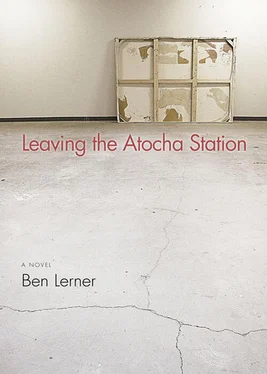But a line materialized. Elena López Portillo had ceased to speak and I could feel a change in pressure on my face, the effect of the audience focusing its eyes upon me. I heard myself say, my voice sounding to me as though it issued from the back of the auditorium, from deep within the audience itself, “Ortega y Gasset wrote ‘By speaking, by thinking, we undertake to clarify things, and that forces us to exacerbate them, dislocate them, schematize them. Every concept is in itself an exaggeration.’” I paused, and could feel the silence tighten, as the audience attempted to take the quotation in. I was encouraged enough by my own prefabricated fluency and by the fact that I did not sound nervous or crazy, to add: “My fear about this panel is that we are in a hurry to define a period, to speak of literature now; every period, like every concept, is in itself an exaggeration. I hope to hear from others what changed on March 11 that permits we to speak,” my grammar faltered, but I could see the sentence’s end, “of a new now, of a new period, without dislocation.” I stopped there, making my brevity seem the issue of my pithiness and courage, the courage to contest the concept of the panel, when in fact I didn’t want to use up any more of my quotations. A murmur of interest ran through the crowd; a current of adrenaline coursed through my body. I glanced at Teresa as Francesc Balda began to speak and I thought her smile communicated pride in me. Now I could attempt to listen to the other panelists; Francesc Balda began by stressing the importance of my point; he shared my healthy suspicion of neat distinctions between a pre-this and a post-that; indeed, perhaps literature’s role was to help us keep our perspective, to take the long view, to allow us to link our “now” to various past “nows” in order to form an illuminating constellation. He then went on to describe something about Catalan literature and its relation to political violence that I failed to follow.
After our brief remarks, María José thanked us and said we’d now take questions from the audience, that microphones were in the aisles, if needed. The house lights were raised a little. The first questions were for particular panelists, but not for me, and I felt increasingly confident that I would be required to speak very little for the remainder of the panel. Someone asked Teresa how she thought her perspective on the relationship between politics and art differed from, say, Elena’s because she had never experienced Franco, being born so near his death, and at some point during her answer, she said something about everyone reflecting his or her historical moment. In a burst of bravado I leaned into my microphone and added: “I agree. No writer is free to renounce his political moment, but literature reflects politics more than it affects it, an important distinction.” Again the murmur, whether of agreement or disagreement, I couldn’t tell, but certainly no one suspected me of being a monolingual fraud; it was a respectable point made well.
But it was stupid to have talked; now Elena, distinguished professor, directed a question at me: “Then why write at all?” She said it without malice, but I was unequivocally the addressee, and I was now required to respond, and against the backdrop of my memorized quip, my speech would seem all the more halting and confused. Any answer would do, cryptic or funny, but I was unable to locate my Spanish; time was passing and I’d parted my lips, but I could not formulate any response. Finally, I said: “I don’t know.” Luckily, Javier took this up as a serious answer, offering a cliché about the art choosing the artist as much as the artist chooses the art. I would not repeat, I promised myself, the mistake of speaking unless forced to speak. The panel continued and there was a long exchange with Francesc about a Catalan writer I’d never heard of, and a skirmish with Javier about El País’ s coverage of some political affair. There were multiple questions for Teresa about her participation in the protests, the possibility of literature as protest, and so on, but I had trouble comprehending her answers. Whenever my fear decreased, a profound fatigue, a fatigue that made concentration as impossible as the fear, broke over me. It was when I was emerging from a spell of fatigue that I realized a question had been addressed to me.
“Can you repeat the question, please?” I asked.
“What Spanish poets have had the greatest influence on your writing and your thinking about the relationship between poetry and political events?” was more or less what I thought he said.
To avoid a long period of silence resulting in another “I don’t know,” I threw him a quotation barely related to his question, if at all: “I’m hesitant to speak,” I said, “about Spanish literature as if I were an expert; to do so would be to fulfill the stereotypes regarding American presumptuousness.” Why it was presumptuous to list Spanish poets I admired was anybody’s guess.
“But who are the poets who have influenced you personally?” the man repeated. This question, perhaps offered out of sympathy for how few queries had been addressed to me, could not have been easier to answer. Just list a few names. “Lorca,” I lied. “Miguel Hernández.” But then, to my horror and amazement, I could not think of another poet; my head was emptied of every Spanish proper name; I couldn’t even think of common names to offer as though they were little known authors. Forget annotating the list, explaining how one poet’s sense of line or of the social influenced my own poetic practice, or relating these poets to my previous comments: just list a few fucking names. Finally I thought of two famous poets I’d barely read: Juan Ramón Jiménez and Antonio Machado, but the names collided and recombined in my head, and I heard myself say: “Ramón Machado Jiménez,” which was as absurd as saying “Whitman Dickinson Walt,” and a few people tittered. I corrected myself, but it came out wrong again: “Antonio Ramon Jimenez,” and now those who were baffled understood my unforgivable error, so extreme they might have at first suspected it was an ironic gesture; several people laughed. The celebrated American fellow cannot get four names deep into the list of the most famous Spanish poets of the twentieth century. “Jiménez and Machado,” I finally said, at least separating the poets out, but it was too late; I had embarrassed myself, the foundation, and I had ruined everything with Teresa. María José said we would take only one more question because of time, but surely she meant because of shame, because of the great shame the foundation felt at sponsoring an American phony, although she was no doubt personally delighted with the scene.
When I confirmed the last question wasn’t for me, I didn’t listen; I just counted the seconds until María José thanked us and asked the crowd to applaud, made some announcement about another panel, asked the crowd to applaud again, and then the lights were fully on and the audience slowly began to leave its seats. Before I could flee, Teresa was upon me, smiling as if nothing had happened, assuring me I had done wonderfully, then chatting with the other panelists. I sat there and said to myself: You’ll be gone in six weeks. You will never see any of these people again. María José cannot nullify your fellowship because you mangled names. None of this matters. Not Teresa or the panel or Spain or Spanish literature or literature in general. Now María José was thanking each of the panelists in turn; she reached me and said my contributions had been brilliant. I smiled a mirthless smile that communicated infinite disdain and thanked her. To myself I was saying: You don’t love Teresa and she doesn’t love you. None of this is real. You don’t like Madrid, with its tourists and dust and heat and innumerable Pietàs and terrible food. The fucking fascists. You are ready to quit smoking, to clean up, to return to friends and family. You have outgrown poetry. You will be a legitimate scholar or a lawyer but you are done with Teresa and hash and drinking and lying and lyric and the intersections thereof. I have never been here, I said to myself. You have never seen me.
Читать дальше












